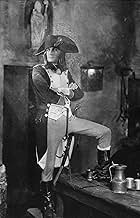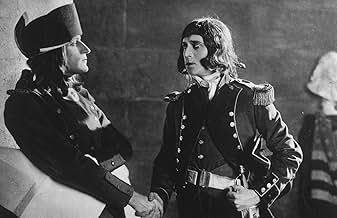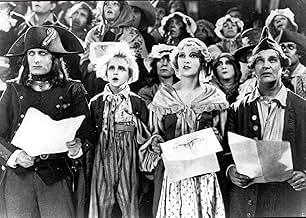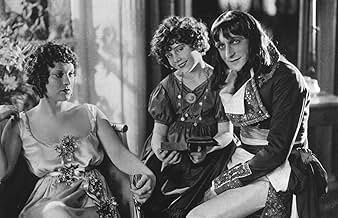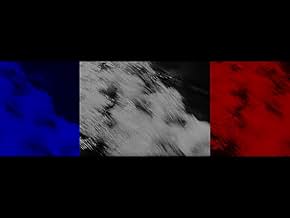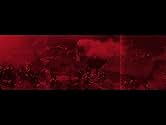VALUTAZIONE IMDb
8,2/10
9519
LA TUA VALUTAZIONE
Un film sulla giovinezza del generale francese e sugli inizi della sua carriera militare.Un film sulla giovinezza del generale francese e sugli inizi della sua carriera militare.Un film sulla giovinezza del generale francese e sugli inizi della sua carriera militare.
- Regia
- Sceneggiatura
- Star
- Premi
- 4 vittorie totali
Nicolas Roudenko
- Napoléon Bonaparte enfant
- (as Vladimir Roudenko)
Max Maxudian
- Barras
- (as Maxudian)
Recensioni in evidenza
Abel Gance's 'Napoleon' was premiered on April 7, 1927, at the Paris Opera House, the first movie to be accorded such an honor
It was been shown on a triple screen and to full orchestral accompaniment, running slightly under four hours
Impressive as it seems, it was conceived as the first of a six-part biography running many hours and tracing the life of Napoleon from childhood to the bitter end in St Helena Fortunately-for Abel Gance who directed and for us-the project was only completed to that moment where Napoleon enters Italy at the head of the French army, and the later and less pleasant aspects of his spectacular career were left unfilmed... The Little Corporal, after all, is a less controversial figure than the Emperor
Gance needed a figure as emblematic and powerful as 'Napoleon' to fulfill his dream of super cinema
'Napoleon' is a masterpiece of excess:
'Napoleon' is like one grand musical composition. It throbs with life
That was Gance the great filmmaker who thought that film could do everything and who said to Kevin Brownlow: 'For me, the cinema is not just pictures. It is something great, mysterious and sublime.' Brownlow is known now not only as an English filmmaker and film historian but also as a great restorer of silent films, notably Abel Gance's 'Napoleon.'
Impressive as it seems, it was conceived as the first of a six-part biography running many hours and tracing the life of Napoleon from childhood to the bitter end in St Helena Fortunately-for Abel Gance who directed and for us-the project was only completed to that moment where Napoleon enters Italy at the head of the French army, and the later and less pleasant aspects of his spectacular career were left unfilmed... The Little Corporal, after all, is a less controversial figure than the Emperor
Gance needed a figure as emblematic and powerful as 'Napoleon' to fulfill his dream of super cinema
'Napoleon' is a masterpiece of excess:
- The child Bonaparte keeps a pet eagle and wins a snow fight while at school in Brienne... In this sequence, the frame splits into nine subliminal images; as Napoleon watches his men entering Italy, the screen expands on each side to form a breathtaking panorama, then changes into three coordinated views of the scene
- The National Convention seems to sway and rock as Napoleon makes his escape from Corsica in a storm-tossed sailboat
- The Gallic of cabaret singers, Damia, leads French troops into battle personifying 'La Marseillaise'
'Napoleon' is like one grand musical composition. It throbs with life
That was Gance the great filmmaker who thought that film could do everything and who said to Kevin Brownlow: 'For me, the cinema is not just pictures. It is something great, mysterious and sublime.' Brownlow is known now not only as an English filmmaker and film historian but also as a great restorer of silent films, notably Abel Gance's 'Napoleon.'
... and remarkable even in it's current, truncated form. The film details the early life of Napoleon Bonaparte (Albert Dieudonne), from his unpleasant childhood in boarding school to his early military life during the French Revolution and the subsequent Reign of Terror, through to his first military victories and marriage to Josephine (Gina Manes). Also featuring Annabella and Abel Gance as Saint-Just.
Gance seems to have taken note of every cinematic technique of the previous 30 years of the medium, combining them all into a breathtaking, exhaustive epic that transcends the time of it's making while being wholly of it, as well. This could not exist with such strength as anything but a silent film, I feel, as the reliance on visual stimulus forced Gance into finding new and exciting ways to express emotion and mood. His early use of montage editing and super-imposition of imagery is stellar. The use of handheld cameras adds to the immediacy of the revolutionary scenes, conveying a newsreel touch that seems far advanced from other films of its day. The sets and costumes are very impressive, as is the cast of thousands. Dieudonne resembles Olivier's Richard III more than any other screen Napoleon that I've seen, but it works, and I wonder if this is the image I'll conjure in the future when thinking of the French military genius.
This movie has a storied existence, with multiple running times and edits throughout the decades. Gance's original version is said to have run over 9 hours, but subsequent edits ran as short as 115 minutes (the 1929 US release). Noted British film historian and preservationist Kevin Brownlow has made it his life's work to try and restore the movie as closely as possible to Gance's original vision. The version that I watched was the recently released BFI version, supervised by Brownlow, and it ran 333 minutes, or about 5 and a half hours. It's definitely a must see.
Gance seems to have taken note of every cinematic technique of the previous 30 years of the medium, combining them all into a breathtaking, exhaustive epic that transcends the time of it's making while being wholly of it, as well. This could not exist with such strength as anything but a silent film, I feel, as the reliance on visual stimulus forced Gance into finding new and exciting ways to express emotion and mood. His early use of montage editing and super-imposition of imagery is stellar. The use of handheld cameras adds to the immediacy of the revolutionary scenes, conveying a newsreel touch that seems far advanced from other films of its day. The sets and costumes are very impressive, as is the cast of thousands. Dieudonne resembles Olivier's Richard III more than any other screen Napoleon that I've seen, but it works, and I wonder if this is the image I'll conjure in the future when thinking of the French military genius.
This movie has a storied existence, with multiple running times and edits throughout the decades. Gance's original version is said to have run over 9 hours, but subsequent edits ran as short as 115 minutes (the 1929 US release). Noted British film historian and preservationist Kevin Brownlow has made it his life's work to try and restore the movie as closely as possible to Gance's original vision. The version that I watched was the recently released BFI version, supervised by Brownlow, and it ran 333 minutes, or about 5 and a half hours. It's definitely a must see.
I saw this back in '81 or '82, on the Big Screen at the Shrine Auditorium in Los Angeles, with Carmine Coppola conducting a live orchestra -- there has never been anything like that in all my movie-going experience! The closest that's come since was _Intolerance_, restored, with another live orchestra performing under the baton of the composer, Gillian Anderson (no, not the one from the X-Files). That, too, was an occasion to remember ... but where is Napoleon on DVD?
As many other reviewers have said, Napoleon was a relevatory experience. Certainly, other films to that point had used most of the devices Gance employed so brilliantly (except, of course, his three-screen-wide "Polyvision"), but then sound came in and the requirements of the microphone killed the recently mobilized camera. The camera became very static for at least the next ten years of films -- dynamic camera movements only returned when sound mixing came in to being, and scenes could be shot MOS (mit out sound), with foley and overdubbing replacing the missed sounds.
For this reason, Napoleon is important to see -- as a technical achievement. But Gance's artistry wasn't limited to gimmicks. His pacing, editing, and direction of the actors (including Dieudonne as Nappy -- looking amazingly Rod-Stewart-like) is excellent as well.
Highly recommended -- and when the DVD comes out -- hopefully, with the fuller, five-hour restoration, and Coppola's music on one track, with a reconstruction of the original music on another (and perhaps Gillian Anderson has a score of her own to share?) -- you'll owe it to yourself, as a student of Film, to see it, over and over again.
As many other reviewers have said, Napoleon was a relevatory experience. Certainly, other films to that point had used most of the devices Gance employed so brilliantly (except, of course, his three-screen-wide "Polyvision"), but then sound came in and the requirements of the microphone killed the recently mobilized camera. The camera became very static for at least the next ten years of films -- dynamic camera movements only returned when sound mixing came in to being, and scenes could be shot MOS (mit out sound), with foley and overdubbing replacing the missed sounds.
For this reason, Napoleon is important to see -- as a technical achievement. But Gance's artistry wasn't limited to gimmicks. His pacing, editing, and direction of the actors (including Dieudonne as Nappy -- looking amazingly Rod-Stewart-like) is excellent as well.
Highly recommended -- and when the DVD comes out -- hopefully, with the fuller, five-hour restoration, and Coppola's music on one track, with a reconstruction of the original music on another (and perhaps Gillian Anderson has a score of her own to share?) -- you'll owe it to yourself, as a student of Film, to see it, over and over again.
I had the privilege of seeing the restored version of this film, to the accompaniment of a live orchestra under the baton of Carmine Coppola, in Los Angeles' un-air-conditioned war memorial. Despite uncomfortable seating and terrible heat, the experience of this four hour movie remains a watershed for anyone who attended. To think that because of the invention of sound, this masterpiece was partially destroyed by Abel Gance in a fit of depression, is heartbreaking. More shocking is that Gance's invention of Cinemascope - of which today only the end of the film retains in its triptych screen effect - was lost to filmgoers until its reinvention years later.
Obviously true art can't be hidden forever, and Gance did live to see Napoleon take its rightful place in cinematic history. Though it is many years later, I can still remember the tears and the ovation when the black screen with the white signature, "Abel Gance", signified the end of the film. A compelling and great work of art.
Obviously true art can't be hidden forever, and Gance did live to see Napoleon take its rightful place in cinematic history. Though it is many years later, I can still remember the tears and the ovation when the black screen with the white signature, "Abel Gance", signified the end of the film. A compelling and great work of art.
January 23, 1981. Radio City Music Hall. Nearly midnight. One of the most thrilling experiences of my life. "Napoleon", restored, and reconstructed, not seen for over fifty years, was debuting in front of 6,000 people packed into the great theater with Carmine Coppolla conducting a huge orchestra rising up on the lift as lighting cast fifty foot shadows of the conductor on the walls. The score was magnificent. By the end of the film when the tryptyches stretched the size of the screen to triple size filling the glorious famous sunburst proscenium, Radio City Music Hall erupted in a standing ovation - and Kevin Brownlow, who restored the film, at that very moment from the theater had Abel Gance (soon to die) live on the phone from France to hear the ovation! Just incredible. Glorious. The film is a masterpiece of the Twentieth Century. And a must see. The best scene was the battle in the Convention between the Girondists and Jacobins superimposed on Napoleon's escape from Corsica in a sea storm. Staggering editing and camera work. It is a tragedy for us all the the remaining chapters of Napoleon's life were never put on film as Gance planned.
Lo sapevi?
- QuizAbel Gance remembered one scene that was removed by the censors--that of the execution of civilians by soldiers. The camera is used like a bullet, zooming towards one human target, then another, then another. The sequence is lost, although a still photograph does survive.
- BlooperOne of the Corsicans in the inn states "Our fatherland is Italy with the Duke of Savoy". The Duchy of Savoy had ceased to exist in 1713 (eighty years earlier), when the Duchy acquired the Kingdom of Sardinia and the Duke then bore the title of the King of Sardinia. Italy was a geographic place not a political entity at this time.
- Versioni alternativeThere are apparently at least 19 different versions of this film, starting with the original 6-hours cut (in a "triptych" format, requiring three projectors on three screens, called Polyvision). It has been shown in various formats and different running times, including a 1934 version re-edited by director Abel Gance and featuring an added soundtrack.
- ConnessioniEdited into Napoléon Bonaparte (1935)
- Colonne sonoreThe Thrill of Being In Love (Love Theme of Napoleon and Josephine)
Music by Carmine Coppola
Lyrics by Italia Coppola (USA version)
UK version: score by Carl Davis (based largely on works by Beethoven)
I più visti
Accedi per valutare e creare un elenco di titoli salvati per ottenere consigli personalizzati
- How long is Napoleon?Powered by Alexa
Dettagli
- Data di uscita
- Paese di origine
- Lingua
- Celebre anche come
- Napoleon
- Luoghi delle riprese
- Domaine des Milelli, Ajaccio, Corse-du-Sud, Francia(Paolists' attack on Bonapartes' country house)
- Aziende produttrici
- Vedi altri crediti dell’azienda su IMDbPro
Botteghino
- Budget
- 20.000.000 FRF (previsto)
- Lordo in tutto il mondo
- 39.448 USD
- Tempo di esecuzione
- 5h 30min(330 min)
- Colore
- Mix di suoni
- Proporzioni
- 1.33 : 1
Contribuisci a questa pagina
Suggerisci una modifica o aggiungi i contenuti mancanti


